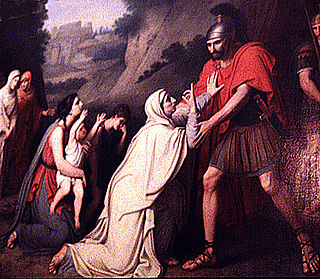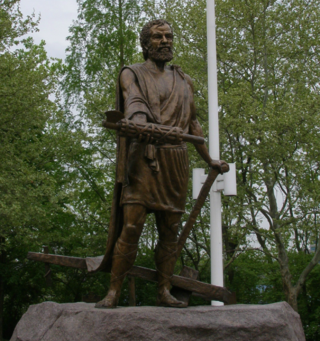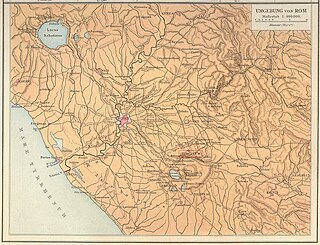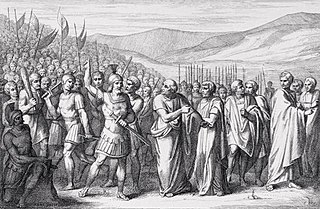Related Research Articles
This article concerns the period 499 BC – 490 BC.

GnaeusMarcius Coriolanus was a Roman general who is said to have lived in the 5th century BC. He received his toponymic cognomen "Coriolanus" following his courageous actions during a Roman siege of the Volscian city of Corioli. He was subsequently exiled from Rome, and led troops of Rome's enemy the Volsci to besiege the city.
Year 492 BC was a year of the pre-Julian Roman calendar. At the time, it was known as the Year of the Consulship of Macerinus and Augurinus. The denomination 492 BC for this year has been used since the early medieval period, when the Anno Domini calendar era became the prevalent method in Europe for naming years.

Lucius Quinctius Cincinnatus was a Roman patrician, statesman, and military leader of the early Roman Republic who became a famous model of Roman virtue—particularly civic virtue—by the time of the late Republic.

The decemviri or decemvirs refer to official ten-man commissions established by the Roman Republic.

The Battle of Mount Algidus was fought in 458 BC, between the Roman Republic and the Aequi, near Mount Algidus in Latium. The Roman dictator Lucius Quinctius Cincinnatus turned an expected Roman defeat into an important victory.

Lucius Minucius Esquilinus Augurinus was a Roman politician who was consul in 458 BC and decemvir in 450 BC.
Appius Claudius Sabinus Regillensis or Inregillensis was the legendary founder of the Roman gens Claudia, and consul in 495 BC. He was the leading figure of the aristocratic party in the early Roman Republic.
Appius Claudius Crassus InregillensisSabinus was a Roman senator during the early Republic, most notable as the leading member of the ten-man board which drew up the Twelve Tables of Roman law around 451 BC. He is also probably identical with the Appius Claudius who was consul in 471 BC.

The gens Minucia was an ancient Roman family, which flourished from the earliest days of the Republic until imperial times. The gens was apparently of patrician origin, but was better known by its plebeian branches. The first of the Minucii to hold the consulship was Marcus Minucius Augurinus, elected consul in 497 BC.
Aulus Sempronius Atratinus was a Roman Republican politician during the beginning of the 5th century BC. He served as Consul of Rome in 497 BC and again in 491 BC. He was of the patrician branch of his gens although the Sempronia gens also included certain plebeian families.
Marcus Minucius Augurinus was a Roman Republican politician of the patrician gens Minucia during the beginning of the 5th century BC. He served as Consul of Rome in 497 BC and 491 BC, both times serving together with Aulus Sempronius Atratinus.
Titus Geganius Macerinus was a Roman politician who served as Consul in 492 BC with Publius Minucius Augurinus.

The first secessio plebis was a significant event in ancient Roman political and social history that occurred between 495 and 493 BC. It involved a dispute between the patrician ruling class and the plebeian underclass, and was one of a number of secessions by the plebs and part of a broader political conflict known as the conflict of the orders.
Attius Tullius was a well-respected and influential political and military leader of the Volsci in the early fifth century BC. According to Plutarch, who calls him Tullus Aufidius, his home town was Antium. Tullius sheltered the exiled Roman hero Gaius Marcius Coriolanus, then incited a war with Rome, in which he and Coriolanus led the Volscian forces. He appears in William Shakespeare's tragedy Coriolanus under the name of Tullus Aufidius.
Lucius Julius Iullus was a member of the ancient patrician gens Julia. He was one of the consular tribunes of 438 BC, magister equitum in 431, and consul in 430 BC.
The gens Genucia was a prominent family of the Roman Republic. It was probably of patrician origin, but most of the Genucii appearing in history were plebeian. The first of the Genucii to hold the consulship was Titus Genucius Augurinus in 451 BC.
Publius Valerius Poplicola was consul of the Roman Republic in 475 BC and 460 BC, and interrex in 462 BC.
Quintus Minucius Esquilinus was, according to tradition, a Roman politician and general from the early Republic, who served as consul in 457 BC as the colleague of Gaius Horatius Pulvillus. During his term of office, a military threat from the Aequi and then the Sabines was said to have prevented internal conflict between the patricians and plebeians. Minucius marched with a force against the Sabines, but was unable to bring the enemy to battle.
According to Roman tradition, it was a Decemvirate that drew up the Twelve Tables of Roman law.
References
- 1 2 Livy, Ab urbe condita , 2.34